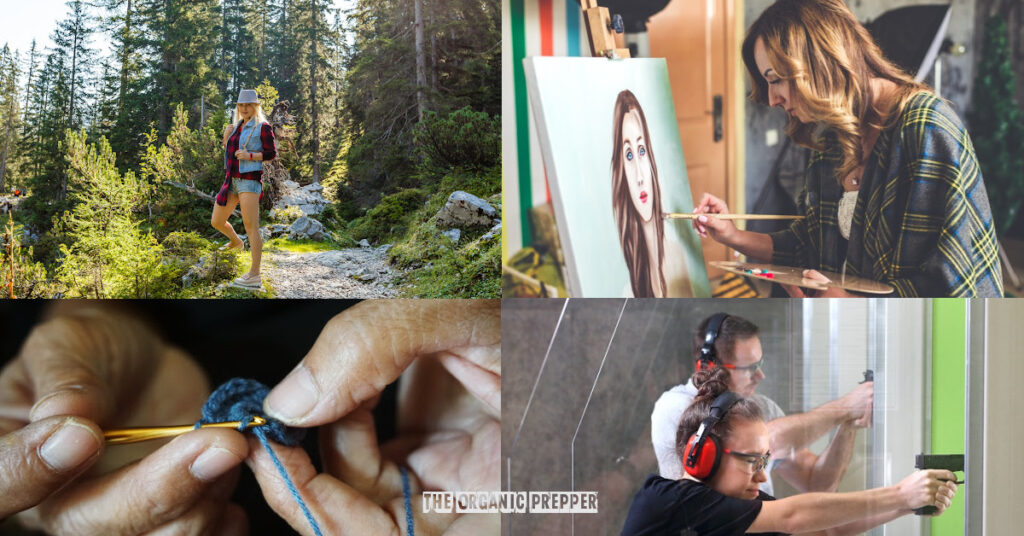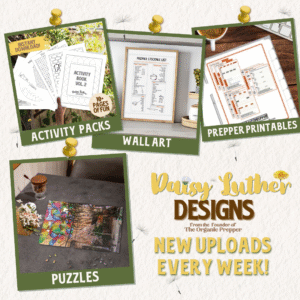If you're new here, you may want to subscribe to my RSS feed. Thanks for visiting!
by the author of The Flat Broke Cookbook
There’s no denying that for many of us, times are tight. Many homes have a basket by the door full of unopened bills. Bank accounts are in overdraft. Every week the charges at the grocery store are a little bit higher than the week before, and for less food. Kids want new clothes and that latest video game, the car needs to be fixed, and people’s jobs are draining the very life from them.
It is vital to take time out of the day to relax. It rejuvenates you, improves your health, and calms your mind so that you can think more clearly. Relaxation, creative activities, and family time can actually be frugal endeavors and not distractions that take away from your efforts to make ends meet.
It can also support your mental health to have productive, enjoyable hobbies during stressful times.
When you have a million and one things to do, though, sometimes it’s difficult to force yourself to stop. This is because stress releases two hormones into your body: adrenaline and cortisol. Excesses of these hormones can cause blood pressure spikes, food cravings that lead to weight gain, and heart disease, to name just a few of the pitfalls.
So, you’ve got to unwind. You need a hobby.
Subscribe to our newsletter
Trying to figure out how to stock up while prices keep climbing? We can help with our free guide and newsletter!
But not these hobbies.
But beware. Some hobbies end up costing you money with nothing to show for it.
Lots of people spend their time doing things like playing golf or tennis, going to concerts or nightclubs, playing pool in a bar, drinking alcohol with friends, or shopping. All of these things have their place, of course, but as a regular part of your daily routine, they can certainly add up in price. If you are already stressed about your finances, these hobbies will give you a brief respite, but in the end, just cause your stress to be worse because of all the money you’ve spent.
Other hobbies kill off a few brain cells as you sit there, passively entertained in an altered state in front of the television or a video game. These things may not really cost you a lot of money, but in the long run, will do little to alleviate stress.
Studies have shown that watching television induces low alpha waves in the human brain. Alpha waves are brainwaves between 8 to 12 HZ. and are commonly associated with … brain states associated with suggestibility…Too much time spent in the low Alpha wave state caused by TV can cause unfocused daydreaming and inability to concentrate….Advertisers have known about this for a long time and they know how to take advantage of this passive, suggestible, brain state of the TV viewer. There is no need for an advertiser to use subliminal messages. The brain is already in a receptive state, ready to absorb suggestions, within just a few seconds of the television being turned on. All advertisers have to do is flash a brand across the screen, and then attempt to make the viewer associate the product with something positive.
Passivity actually opens up the door to your brain and allows you to be programmed – it becomes easier to convince you that you need these things that are being advertised. It inhibits your critical thinking skills and leaves your brain craving even more time in this low Alpha state. This is the reason that some people sit blankly in front of the TV for hours every night until they fall asleep on the couch and then get up to do it all over again.
It’s important to choose your spare time activities in a manner that enhances your brain function, instead of reducing it. In a world where, for many, entertainment means playing on your iPhone or sharing photos on Facebook, opting for industry for your downtime can be an unusual choice. But choosing productive hobbies is a great way to relax. What’s more, if your brain is engaged in an activity while you view a television program or movie, then you are not as susceptible to messages, either subliminal or blatant. This means that you don’t actually have to keep the TV turned off at night – you just need to refrain from zoning out in front of it.
Hobbies keep me sane.
I’ve been grounded for three years with chronic illness and disability. My time to get up and move around is limited. I have to ration out household chores in 15-minute increments throughout the week.
So clearly, when I’m not writing, you can often catch me streaming TV shows or learning something from YouTube videos. The difference is, I don’t just sit there. Actually, I’m pretty much incapable of simply sitting there watching something. My brain just doesn’t work that way. I’ll fall asleep or lose track of the show.
I use the time I spend watching a show to get through the mindless tasks I just don’t enjoy, like mending, repairing broken items, or paying bills. If I’ve got no passive chores, then I crochet, embroider, or do something artsy-craftsy. I’m no researcher, but I think being actively engaged in other activities while the television is on makes a big difference regarding the low alpha waves described above.
When the TV is not on, I spend time doing word puzzles (hello, NYT crossword puzzle, the only good thing to come out of the NYT), learning languages, and reading.
If I didn’t take joy from doing things like this, I would have truly lost my mind over the past three years since I destroyed the tendon in my ankle. At first, I resisted, thinking I’d be better in no time, and I didn’t need to learn any new hobbies. I lay there on my couch, staring at the television. I was depressed, and my brain wasn’t engaged in anything. Half the time, I couldn’t remember what I’d watched the day before.
But, as it turned out, I wasn’t better, and things with my health went sideways. Developing hobbies and skills has been a saving grace for me. I’m really lucky I’ve found things I enjoy to fill the time I used to spend traveling, going to the gym, and walking. I’m not saying making a piece of art for the front hallway is as good as a trip to Greece, but with the right mindset, it helps me be happy and content with the life I have now.
A brief lesson from young Ben Franklin
In 1726, 20-year-old Benjamin Franklin sought to cultivate his character. He listed off the thirteen virtues that he believed were important to living a good life, one of which was industry.
Franklin wrote of this characteristic,
“Industry: Lose no time; be always employed in something useful; cut off all unnecessary actions.”
He believed that the pursuit of productivity would build character and help the practitioner to lead a more successful and moral life. In his autobiography, Franklin wrote, “I hope, therefore, that some of my descendants may follow the example and reap the benefit.”
Think back to the days before television. People worked hard all day long, producing food, cutting wood, cooking, hunting, building…it was a full-time job to survive and thrive. In the evenings, by candlelight, they could stop and put their feet up for a while. Books were not widely available like they are now, so families passed the time by performing stitchery, carving, making furniture, mending things and creating items that made their lives more pleasant and beautiful. Sometimes a family member would read aloud, play an instrument or sing. Time was of value and not to be wasted, and there was rarely money to spare on an “evening out”.
Opt for activities that enhance your frugality
Nearly 300 years later, we can apply Franklin’s philosophy of industriousness and productivity to our lives today. When choosing leisure activities, consider opting for a productive hobby.
It should either…
- Teach something
- Create something
- Repair something
- Improve something
That leaves the door wide open to a broad range of choices. If you tend to be an overachiever, then you can relax without the guilt of worrying about all the things that you “should” be doing instead of chilling out. As a longtime student of cheapskatery, I’ve found that most people who are effectively frugal have hobbies that are productive and don’t enjoy wasting time, even leisure time.
Sometimes your hobby can even turn into an additional source of income. Many people have been extremely successful in setting up starting their own Etsy empires or participating in the craft show circuit
.
I have found hobby supplies at many places that are less expensive than big box stores like Hobby Lobby and Michaels. Amazon can be a cheap source of supplies, and I’ve found many supplies at yard sales and thrift stores. I also love to incorporate things from nature. Be creative about where your craft items come from and you will open the door to much more creativity.
Some productive hobbies to choose from…
Not only can some of these hobbies be an enjoyable way to pass the time or add to your economic bottom line, but they can provide beautiful, lower-cost options for gift-giving, which is a frugal bonus.
Not only should you, yourself, be indulging in these pastimes, but you should be passing these skills on to your children. When you do, you are creating not only useful and lovely items but irreplaceable family memories. Our living room was always filled with pretty baskets which all hid the supplies for various crafts and hobbies. Of an evening, you could most often find us creating while a movie or music plays in the background.
- Reading
- Sewing clothing, curtains, and soft furnishings
- Knitting, crocheting, and weaving
- Carving
- Repairing broken items
- Mending
- Making soap and other personal care items
- Building furniture
- Making pottery
- Cooking
- Baking
- Writing
- Drawing and creating art
- Playing an instrument
- Singing
- Making cards
- Making jewelry
- Fletching
- Gunsmithing
- Making ammo
- Welding and soldering
- Learning a language
- Caring for animals
- Playing a word, math, or strategy game
- Marksmanship (archery and firearms)
- Exercise
- Gardening
- Preserving food
- Practicing outdoor skills like hiking, camping, tracking, and foraging
- Hunting
- Fishing
- Automotive repair
- Scrapbooking
- Embroidering or cross-stitching
- Upcycling old things into new, useful ones
- Crafting greeting cards
- Refinishing furniture
- Puzzles (Jigsaw, crossword – all of them are good for your brain)
- Playing games with the kids (this can be educational and fun at the same time)
- Bicycling
What are your productive hobbies?
This list is certainly not comprehensive. If I’ve left off your favorite pastime, take a couple of minutes to tell us about it in the comments section. How do you unwind? What do you like to do in your spare time?
















9 Responses
Honestly, I’d love to be a kitten farmer. Last year we increased our barn family because the critters were getting too close to the house. Since we are allergic to pets in the house, the barn is our best option, they bring such joy watching how energetic & grateful they are for life.
My fave past time is exercising & probably cycling. Fast. We used to ride 50-100 miles a week. Stress melted off. Slower things have taken its place since new aches & pains creep in. Playing in my garden brings a lot of joy.
Amateur radio is a great hobby. It can be low cost to skies the limit. Make contacts and friends around the world with 100 watts and a wire or make local contacts with a Baofeng UV-5R (get a pair for $38 delivered to your door.) And when comms go down, no internet, no cell phone, that is when Amateur Radio really works. When all else fails…go with amateur radio.
I can’t sit still and mindlessly watch television. I have several crochet and embroidery projects going all the time. I move from one to another as I get bored with one. It used to bother my husband, who thought I should work on only one thing until it was finished before starting something else. If I tried that I would never get anything done. As it is I finish things by not trying to stay on only one.
#1 is reading. Crochet, crafts, plants, rearrange the furniture (lol, I know), garden, landscaping, and Pinterest for getting ideas! I’ve done so many crafts I need to start on the craft show circuit! I also do a cook fest weekly and prepare all of the food for the week in one go. My TV time is HGTV and Magnolia Network.
Dear Daisy, You are truly an amazing person. I have followed your journey since you took that trip to Greece. Every week I look forward to your emails.
This winter I have developed an hear for classical music. There is a you tube video called “The 50 most Beautiful Classical pieces”. I listen to that while doing things around the house.
The “basement farm” is a place I love in the winter. I over winter plants and grow greens for salads. A new interest is learning the tongue drum. Mellow sounds.
Thank you for all you do!!!
I used to craft and do craft shows, but storing all the wreath making supplies became impossible, and very expensive! I have been slowly trying to eliminate my supplies, but I really want some money for them. There is a point that I must just donate and move on, because my peace of mind is worth more than the money. I used to do bead work, making jewelry and suncatchers, but have no time to sell, so quit doing that. At least the supplies don’t take up as much space! 🙂
With my impossible schedule, I can’t do much any more. I work full time, care for my 91 yr old Mom on Saturdays, and manage her health care and bills during the week even if I am taking breaks during work. I also care for my DH, who has been in poor health for over a year and a half. He works full time also, and we are in the ministry, so Sunday’s are full. By the time I sit at the end of the day, I usually fall asleep in my chair. I joke about the 8:00 PM nap before bedtime, but it is a real thing at least half of the time.
Enough about what is hard, and on to what is productive! I do keep chickens, and I garden. When I have time, I can my produce, but that isn’t really relaxing, it is work. I often just chop and freeze stuff that really should be canned. I share my produce that I can’t put up, but I don’t get money for it. Too busy to monetize that. I also LOVE to cut the grass on my tractor. I find that to be relaxing! I think the noise and vibration shut off my anxiety like having colicky baby near a running vacuum cleaner. I hate housework, but I love to be outside.
On the other hand, I also fix stuff, which my Dear Husband isn’t interested in doing, so I have that outlet also. I wish my hobbies would bring in some money, but chickens cost more to raise than the cost of eggs, so not much more than pets who don’t quite pay for themselves in my area.
How about Diamond Painting? Yes, the kits cost money but I’ve found very inexpensive sources for them. I enjoy them and they improve my ability to concentrate.
I absolutely LOVE diamond painting! It’s so nice to end up with something pretty for in the house and since I’m a gallery wall girl, I feel I can make quite a number before running out of inspiration! Would you be willing to share some of your inexpensive sources?
I’m a beach addict and have been collecting shells, sea glass and driftwood for years. After retirement I saw someone at a craft fair who made beautiful creations with sea glass. I thought, I can do that! And so I started making sea glass, shell and driftwood wall hangings and started selling them in FB marketplace. It gets me in my zone and brings me a lot of joy. I also like to garden, read (love love love collecting books too) and bike ride. All free or cheap hobbies 🙂